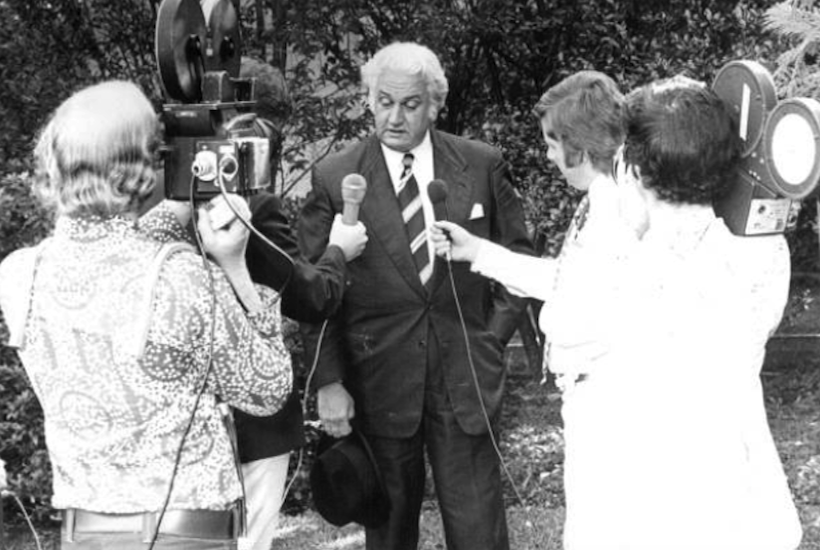You will have heard of the rule of law, that people in positions of authority should exercise their power within a constraining framework of well-established laws rather than in an arbitrary, discretionary manner.
On two occasions since federation, that principle was crushed by appointed officeholders. Most people remember only the second occasion which shares its anniversary with Armistice Day. On 11 November 1975 the Governor-General, Sir John Kerr, claiming a discretionary prerogative power, dismissed Gough Whitlam’s government and appointed Malcolm Fraser in his place.
In his 1977 autobiography, Matters for Judgment, Sir John claimed he held a reserve power to act and Chief Justice Sir Garfield Barwick agreed with him in a private advice. In his post retirement 1983 essay, Sir John Did His Duty, Barwick echoed an earlier work of Prof George Winterton, that the Governor-General’s power was statutory and found in sec. 64 of the Constitution.
Despite the conflicting opinions of the two lawyers, many still believe that the electorate’s subsequent choice of Malcolm Fraser proves Sir John’s action was legal. But conflicting opinions must surely raise a doubt, and the only independent authority on the Constitution are the delegates who debated the political scheme that the words of the Constitution were drafted to create.
What is clear from the transcripts of the 1897-98 Constitutional Convention debates, is that the principles of responsible government that were woven into the fabric of the Constitution’s text required the Governor-General to always act with ministerial advice, refuting both Sir John’s claim for a prerogative power and Barwick’s literal construction of sec. 64.
The Constitutional Convention consisted of fifty elected delegates who were both professionally and politically experienced. About a third of them were lawyers of whom seven were Queens Council; many others held high political office. Our Constitution is unique in the British Empire, for it was not only ratified by five colonial electorates but cannot be altered without the people’s consent which vested sovereignty in the Australian people.
Sir John argued that his reserve power permitted him to use sec. 64 without ministerial advice to dismiss Whitlam; that it was only to be exercised in times of crisis, to take control and return the nation to order. His argument resembles that of the 1930’s German jurist, Carl Schmitt.
Barwick, however, denied Kerr’s power was a reserved prerogative. He found the power in sec. 64 of the Constitution by interpreting two phrases in that section literally – one, where the ‘Governor-General’ is said to exercise a power, the other where the ‘Governor-General in Council’ is said to exercise a power. The ‘Council’ is the Federal Executive Council, the source of ministerial advice.
Section 64, contains both phrases and, where relevant, states:
The Governor‑General may appoint officers to administer such departments of State of the Commonwealth as the Governor‑General in Council may establish. … They shall be members of the Federal Executive Council, and shall be the Queen’s Ministers of State for the Commonwealth
Interpreting it literally, Barwick argued that the section gives the ‘Governor-General’ a power to appoint which includes a power to dismiss without the FEC’s advice. He concluded that the Governor-General, therefore, had a power to dismiss the Whitlam government without the need for ministerial advice.
During the Constitutional Convention, however, when the delegates were considering the equivalent of sec. 64, the NSW Premier, George Reid was concern that without the words ‘by and with the advice of the Executive Council’ where ever the Governor-General was directed by the Constitution to do something, it might be thought – as Chief Justice Barwick had – that the Governor-General could act without ministerial advice. Reid wanted those extra words included to prevent just such a conclusion
The Leader of the Convention, Edmund Barton QC rejected Reid’s suggestion as unnecessary because of the wording of sec. 61. He explained that the phrases ‘Governor-General in Council’ and ‘Governor-General’ were simply a drafting technique expected by British lawyers (in London).
Barton explained the two phrases as reflecting two classes of executive acts of the Crown: those exercised by the prerogative and those that were the result of statutes; only in the latter was it said that the Executive should act in Council. Where an act is done pursuant to the prerogative, it was unnecessary to add the words ‘in Council’ because it was not possible for the prerogative to be exercised personally by the Crown: “The prerogative is never in these days exercised as a personal act of the Crown as we understand it.”
Expressing the general principle of democratic responsible government, Barton explained that while the prerogative was not expressed to be exercised with the consent of the Executive Council, the advice from those answerable to the people was always necessary:
The point of the matter is that where the expression of the Act is in the form commonly used to indicate a prerogative act – that is without the addition of the words ‘in Council’ – that does not indicate any real personal power in the depositary of the Crown’s authority.
What were prerogative powers in the unwritten British Constitution – which are only exercisable with ministerial advice – are distinguished in Australia’s written Constitution by the absence of the words ‘in council’; but can only be exercised with ministerial advice. Barton’s view which was accepted by all the delegates became the law in our Constitution to which the colonial peoples consented.
In answering George Reid’s intended amendment, Barton refutes Kerr, Barwick and those who advised Sir John. When Kerr’s action is considered in light of the Constitution, his dismissal of the Whitlam government was unconstitutional and a breach of the rule of law. It is too late now to do anything about it. But we must be on our guard against the next time.
Kerr’s breach of the rule of law and one other are more fully analysed in Dr Long’s book, Australia’s American Constitution and the Dismissal, published by Lexington Press.
Got something to add? Join the discussion and comment below.
Get 10 issues for just $10
Subscribe to The Spectator Australia today for the next 10 magazine issues, plus full online access, for just $10.

























Comments
Don't miss out
Join the conversation with other Spectator Australia readers. Subscribe to leave a comment.
SUBSCRIBEAlready a subscriber? Log in